
As an elderly caregiver, you may need to help with things like grocery shopping, cooking, managing medication, and even helping with appointments. Caregiver responsibilities will depend on the health and needs of the individual being cared for.
What does it mean to be a caregiver?
A caregiver is someone who takes care of the well-being and health of an individual who requires assistance with daily activities and tasks. A caregiver may be needed by an elderly loved one due to an injury, illness, mobility issues, memory problems, or other chronic conditions that make daily chores more difficult.
Long-term caregiving can have a significant impact on caregivers’ physical and emotional health, depending on how much support is provided. To determine if in-home care is right for you, and if you need more specialized care, consider the health and abilities of your loved one.
What is a caregiver supposed to do?
While assisted living caregiving duties may vary each day, some basic tasks remain the same when caring for an aging parent or senior loved one.
You can expect to take on the role of caregiver for an elderly family member.
1. Assess the medical needs
It is the responsibility of caregivers to check on the health of their senior loved ones. You might be asked to assist with managing chronic conditions, pain management, scheduling medical appointments, and medication management. It is a good idea for your loved one to talk about their health with their doctor and other healthcare professionals.
2. Prepare a care plan
When you start your journey of caregiving, it can be beneficial to create a care plan that addresses the needs and goals of your senior loved ones. You can use a plan to determine the daily care that your loved one needs and whether additional support is needed to protect their safety and health.
3. Assist with the basic needs
Mobility and memory issues can make it difficult for someone with dementia to do daily activities (ADLs), such as bathing, dressing, and toileting. To determine if your loved ones need additional assistance, check in frequently and pay close attention to any changes or signs.
4. Offer companionship
Companionship is an essential part of senior caregiving that’s often overlooked. Loneliness in senior caregiving can have serious consequences for health, including depression. At Reflections Assisted Living we create opportunities to strengthen bonds and connections with regular group activities.
5. Housekeeping assistance
Maintaining a home for your loved one can be more difficult as they age. Older adults might need assistance with chores such as vacuuming, dishes washing, and garbage collection. Your loved one may find yard work such as snow shovelling or daily maintenance too difficult for them. You might be able to offer support and convenience to your loved one in a senior living facility.
6. Monitor medication
Many prescription drugs are prescribed to older adults for chronic conditions. It is possible that your loved one needs assistance in keeping track of their medications, understanding drug interactions and taking the prescribed dosages. Monitoring your loved one’s medication and setting up reminder systems can help reduce the risk of medication misinterpretations and other health problems.
7. Regularly review your care plan
The care plan should be modified as your life and that of your loved one change. To determine what is working and what is not, review your caregiver duties regularly. To discuss any changes, keep in touch with your loved one’s physician and other healthcare professionals.
8. Make sure to prepare meals
As we age, food preparation can be more difficult. Your loved one may not have the motivation or energy to cook if they are alone. Some people may have memory or balance problems that make cooking difficult. As a caregiver, your role is to help the loved one with grocery shopping, cooking, and finding alternative recipes.
9. Assist with mobility and transfer
Falling is a serious risk for older adults’ health. You may notice that your loved one is having difficulty moving from their bed to a chair. You can help prevent falls for your loved ones and keep them safe and comfortable.
10. Transport
Public transportation and driving might no longer be options for your loved ones as they age. To get your loved one to appointments or other activities, you might want to consider senior transportation options.
Contact Reflections Assisted Living at Carolina Forest today if you feel you have the ability to provide more assistance to your loved ones in caring for them or if you think they would benefit from senior living communities.
Like our Facebook page for more great info about assisted living.
Reflections Assisted Living at Carolina Forest
219 Middleburg Dr
Myrtle Beach, SC 29579
(843) 903-0700
https://www.reflectionsassistedliving.com/


No comments:
Post a Comment